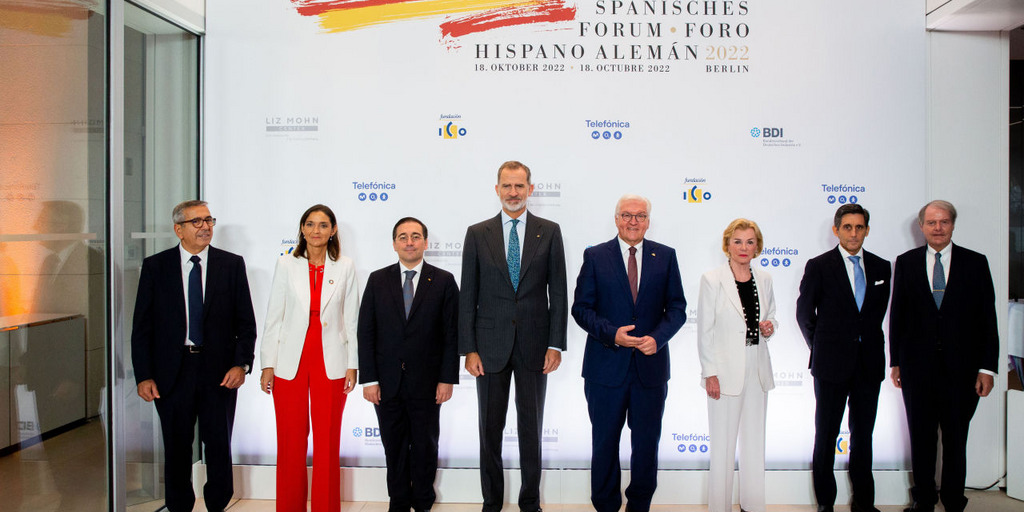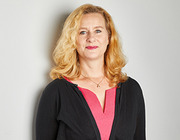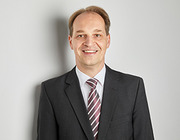Dedicated to the topic "Working together to shape a digital and sustainable future in Europe," the 10th German-Spanish Forum took place today in Berlin, organized by the Bertelsmann Stiftung's Liz Mohn Center together with Telefónica, the Fundación ICO and the Federation of German Industries (BDI). For Liz Mohn, co-president of the German-Spanish Forum, exchange between the two countries is the primary focus.

Working together to shape sustainability and digitalization for Europe’s future
The 10th German-Spanish Forum took place today in Berlin, organized by the Bertelsmann Stiftung’s Liz Mohn Center together with Telefónica and the Fundación ICO. Participants included the King of Spain, Felipe VI, and German President Frank-Walter Steinmeier. German Economics Minister Robert Habeck also attended the conference which was dedicated to the topic "Working together to shape a digital and sustainable future in Europe."
Content
We can no longer overcome our challenges alone and must address the question of how we can create and ensure more unity and common ground in an increasingly complex and fragmented world
Liz Mohn, co-president of the German-Spanish Forum
The forum opened with remarks by King Felipe VI and German President Frank-Walter Steinmeier.
The initial question addressed at the German-Spanish Forum was how both countries can work together to promote competitiveness through sustainability and digitalization. Geopolitical developments, the war in Ukraine and the Covid-19 pandemic have been fundamental challenges for many companies in Germany and Spain. In addition, sustainability and digitalization are important factors in strategic planning, but also have a concrete impact on the daily business of industrial, financial, touristic and retail firms. One common concern, however, is whether the corresponding strategies could be a competitive disadvantage compared to other countries and continents that place less value on sustainability. The business community faces the task of having to respond to all these challenges simultaneously. Participants in the panel discussion addressing this topic included José María Alvarez-Pallete, chairman & CEO of Telefónica S.A., and Belén Garijo, chair of the Executive Board of Merck KGaA.
During a subsequent discussion, Ernesto Antolín, chairman of Grupo Antolín, Uwe Fröhlich, co-CEO of DZ Bank AG, and Michael Rüdiger, chairman of BlackRock Deutschland, among others, spoke on the topic "Financing and investing in the industrial transformation." In May 2021, the European Union updated its industrial policy strategy, drawing on lessons from the pandemic. The primary goal is the EU's economic recovery and its strategic, technological and industrial independence. Crucial aspects are increasing the single market’s ability to withstand shocks and disruptions, ensuring the free flow of people, goods, services and capital, accelerating the green and digital transformation, and strengthening the EU's strategic independence. One possibility for dealing with crises would be to develop uniform emergency measures within the EU in order to cushion the impact of future market disruptions and secure the unimpeded movement of goods and services and the availability of key products.
The conference was held in Bertelsmann’s representative office at Unter den Linden 1 and
concluded with remarks by German Economics Minister Robert Habeck and Spanish
Industry Minister Maria Reyes Maroto.
The objective of the 10th German-Spanish forum was to exchange views on the existing
challenges related to sustainability and digitalization in Europe and to develop joint solutions
for shaping this transformation. The focus was on the current needs of different economic
sectors and increasing the competitiveness of the German and Spanish economies.
Material
The German-Spanish Forum was established in November 2002 on the initiative of the
Spanish and German governments. Under the patronage of the German and Spanish heads
of state, the forum facilitates an exchange of views among political, economic, cultural and academic leaders from both countries. The venue for the forum rotates regularly between Spain and Germany.
Founded in 2022 as a Bertelsmann Stiftung initiative, the Liz Mohn Center continues Liz Mohn's civic engagement within an independent institution. The center facilitates the global transfer of knowledge through various activities as a way of improving the quality of decisions made by leaders in the political, business and cultural spheres based on evidence-driven findings. In addition, it supports leaders in leading sustainably and responsibly. The center also promotes understanding between nations and cultures while assisting young talents from various areas of society in their self-development. The Liz Mohn Center is a nonprofit limited liability company. For more information, please visit: www.Liz-Mohn-Center.de




